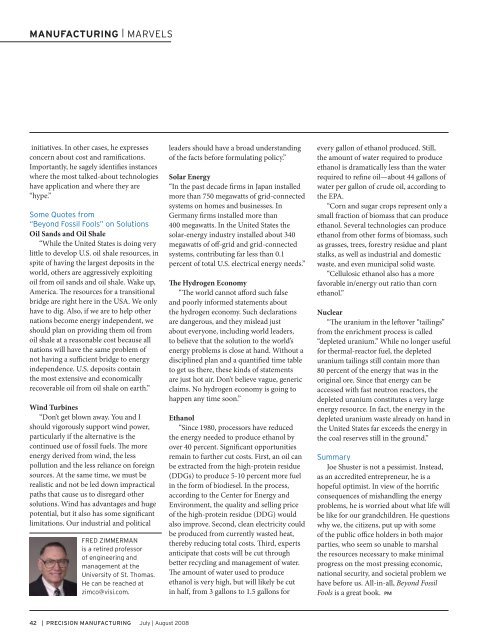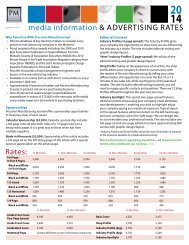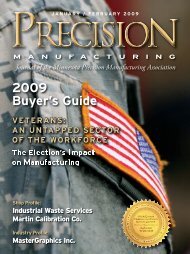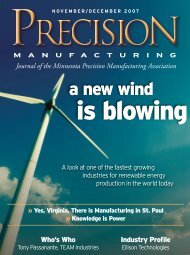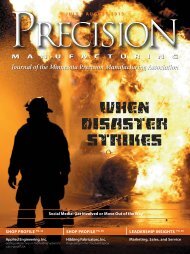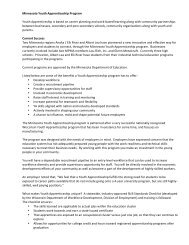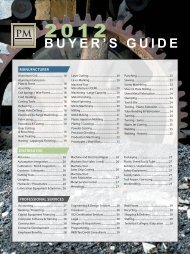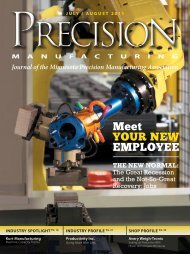July / August - Minnesota Precision Manufacturing Association
July / August - Minnesota Precision Manufacturing Association
July / August - Minnesota Precision Manufacturing Association
Create successful ePaper yourself
Turn your PDF publications into a flip-book with our unique Google optimized e-Paper software.
initiatives. In other cases, he expresses<br />
concern about cost and ramifications.<br />
Importantly, he sagely identifies instances<br />
where the most talked-about technologies<br />
have application and where they are<br />
“hype.”<br />
<br />
<br />
Oil Sands and Oil Shale<br />
“While the United States is doing very<br />
little to develop U.S. oil shale resources, in<br />
spite of having the largest deposits in the<br />
world, others are aggressively exploiting<br />
oil from oil sands and oil shale. Wake up,<br />
America. The resources for a transitional<br />
bridge are right here in the USA. We only<br />
have to dig. Also, if we are to help other<br />
nations become energy independent, we<br />
should plan on providing them oil from<br />
oil shale at a reasonable cost because all<br />
nations will have the same problem of<br />
not having a sufficient bridge to energy<br />
independence. U.S. deposits contain<br />
the most extensive and economically<br />
recoverable oil from oil shale on earth.”<br />
Wind Turbines<br />
“Don’t get blown away. You and I<br />
should vigorously support wind power,<br />
particularly if the alternative is the<br />
continued use of fossil fuels. The more<br />
energy derived from wind, the less<br />
pollution and the less reliance on foreign<br />
sources. At the same time, we must be<br />
realistic and not be led down impractical<br />
paths that cause us to disregard other<br />
solutions. Wind has advantages and huge<br />
potential, but it also has some significant<br />
limitations. Our industrial and political<br />
<br />
<br />
<br />
<br />
<br />
<br />
<br />
leaders should have a broad understanding<br />
of the facts before formulating policy.”<br />
Solar Energy<br />
“In the past decade firms in Japan installed<br />
more than 750 megawatts of grid-connected<br />
systems on homes and businesses. In<br />
Germany firms installed more than<br />
400 megawatts. In the United States the<br />
solar-energy industry installed about 340<br />
megawatts of off-grid and grid-connected<br />
systems, contributing far less than 0.1<br />
percent of total U.S. electrical energy needs.”<br />
The Hydrogen Economy<br />
“The world cannot afford such false<br />
and poorly informed statements about<br />
the hydrogen economy. Such declarations<br />
are dangerous, and they mislead just<br />
about everyone, including world leaders,<br />
to believe that the solution to the world’s<br />
energy problems is close at hand. Without a<br />
disciplined plan and a quantified time table<br />
to get us there, these kinds of statements<br />
are just hot air. Don’t believe vague, generic<br />
claims. No hydrogen economy is going to<br />
happen any time soon.”<br />
Ethanol<br />
“Since 1980, processors have reduced<br />
the energy needed to produce ethanol by<br />
over 40 percent. Significant opportunities<br />
remain to further cut costs. First, an oil can<br />
be extracted from the high-protein residue<br />
(DDGs) to produce 5-10 percent more fuel<br />
in the form of biodiesel. In the process,<br />
according to the Center for Energy and<br />
Environment, the quality and selling price<br />
of the high-protein residue (DDG) would<br />
also improve. Second, clean electricity could<br />
be produced from currently wasted heat,<br />
thereby reducing total costs. Third, experts<br />
anticipate that costs will be cut through<br />
better recycling and management of water.<br />
The amount of water used to produce<br />
ethanol is very high, but will likely be cut<br />
in half, from 3 gallons to 1.5 gallons for<br />
every gallon of ethanol produced. Still,<br />
the amount of water required to produce<br />
ethanol is dramatically less than the water<br />
required to refine oil—about 44 gallons of<br />
water per gallon of crude oil, according to<br />
the EPA.<br />
“Corn and sugar crops represent only a<br />
small fraction of biomass that can produce<br />
ethanol. Several technologies can produce<br />
ethanol from other forms of biomass, such<br />
as grasses, trees, forestry residue and plant<br />
stalks, as well as industrial and domestic<br />
waste, and even municipal solid waste.<br />
“Cellulosic ethanol also has a more<br />
favorable in/energy out ratio than corn<br />
ethanol.”<br />
Nuclear<br />
“The uranium in the leftover “tailings”<br />
from the enrichment process is called<br />
“depleted uranium.” While no longer useful<br />
for thermal-reactor fuel, the depleted<br />
uranium tailings still contain more than<br />
80 percent of the energy that was in the<br />
original ore. Since that energy can be<br />
accessed with fast neutron reactors, the<br />
depleted uranium constitutes a very large<br />
energy resource. In fact, the energy in the<br />
depleted uranium waste already on hand in<br />
the United States far exceeds the energy in<br />
the coal reserves still in the ground.”<br />
<br />
Joe Shuster is not a pessimist. Instead,<br />
as an accredited entrepreneur, he is a<br />
hopeful optimist. In view of the horrific<br />
consequences of mishandling the energy<br />
problems, he is worried about what life will<br />
be like for our grandchildren. He questions<br />
why we, the citizens, put up with some<br />
of the public office holders in both major<br />
parties, who seem so unable to marshal<br />
the resources necessary to make minimal<br />
progress on the most pressing economic,<br />
national security, and societal problem we<br />
have before us. All-in-all, Beyond Fossil<br />
Fools is a great book. PM


